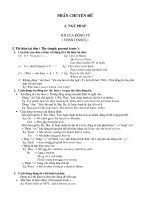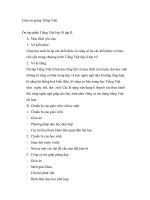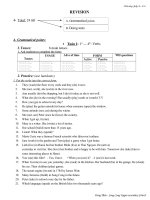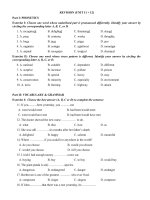On tap tieng anh 10 CB
Bạn đang xem bản rút gọn của tài liệu. Xem và tải ngay bản đầy đủ của tài liệu tại đây (100.61 KB, 4 trang )
REVISION (UNIT 11 + 12)
Part I: PHONETICS
Exercise I: Choose one word whose underlined part is pronounced differently. Identify your answer by
circling the corresponding letter A, B, C, or D.
1. A. recognized B. delighted C. threatened D. stayed
2. A. peas B. contests C. works D. thoughts
3. A. buzz B. jazz C. pizza D. zoo
4. A. maintain B. contain C. rainforest D. mountain
5. A. animal B. recognize C. tropical D. chemical
Exercise II: Choose one word whose stress pattern is different. Identify your answer by circling the
corresponding letter A, B, C, or D.
6. A. national B. suitable C. dependent D. different
7. A. surprise B. increase C. pollute D. poison
8. A. entertain B. special C. heavy D. easy
9. A. conservation B. minority C. especially D. environment
10. A. toxic B. farming C. highway D. attack
Part II: VOCABULARY & GRAMMAR
Exercise I: Choose the best answer (A, B, C or D) to complete the sentence
11. If you............here yesterday, you .............me
A. were/would meet B. had been/would meet
C. were/would have met D. had been/would have met
12. The doctor showed the new nurse …………… to do.
A. what B. that C. how D. as
13. She was still ………… six months after her father’s death.
A. delighted B. happy C. solemn D. mournful
14. Where ……………if you could live anywhere in the world?
A. do you choose B. would you chosen
C. would you choose D. will you choose
15. I wish I had enough money …………. a new car.
A. buying B. buy C. to buy D. would buy
16. The giant panda is a(n) …………….species.
A. dangerous B. endangered C. danger D. endanger
17. Beethoven is one of the greatest …........... who ever lived.
A. composers B. singer C. singers D. composer
18. If John.................that there was a test yesterday, he....................
A. had known -would have studied B. knows - will study
C. knew - would study D. knew - would have studied
19. It's pity the lake wasn't frozen yesterday. If it......frozen, we......skating.
A. had been - could have gone B. would have been/ had gone
C. was - could go D. would be - would have gone
20. Cuc Phuong National Park is.........160 km South West of Hanoi.
A. lie B. established C. abandoned D. located
Exercise II: Fill each blank with the correct form of the word in brackets
21. “You (find)…………………… the key which you (lose)…………….. yesterday?” “Yes. I (find) it in
the pocket of my other coat.”
22. I look forward to (see)…………… you.
23. If I (be)...................... you, I (save)............................ some of your lottery winning.
24. We (win)...................... the game if we’d had a few more minutes.
25. If he hadn’t wasted too much time, he (not fail)........................ in his examination.
26. She’s a brilliant ________ but she prefers painting and drawing. (MUSIC)
27. People with very ___________ skin shouldn’t go sunbathing for long periods. (SENSE)
28. The group called “Friends of the Earth” is concerned about the ________ of the natural environment.
(CONSERVE)
29. The weather was terrible, so we had a very __________ holiday. (PLEASE)
30. During his ____________, the family lived in Cornwall. (CHILD)
Exercise III: Identify ONE mistake in each following sentence
31. (A)If Nick hadn't (B)come along, I (C)don't know what (D)would happen.
32. I (A)succeeded in (B)to find a job, so my parents (C)didn’t make me (D)go to college.
33. Mai (A)bought a bus ticket and (B)spent a month (C)to travel (D)in Dalat.
34. The next (A)important question I (B)have to decide is (C)when (D)do I have to finish my work.
35. The secretary (A)told me (B)don’t smoke (C)in (D)the office.
Part III: READING
Read the following passages, and then answer questions 36 - 55
PASSAGE 1
Many studies have shown that children who enjoy music perform better in school. This doesn’t mean that
you have to take a college class in music in order to help your child appreciate music, but to spend some time
talking about, and listening to a wide variety of music with your child.
If you start when your baby comes home from the hospital, you should spend some quiet time with your
child listening to and enjoying music. Sing along with the radio because it is important that your child hears
your voice, and the music.
When your child can sit in your lap, clap your hands in time to the music; bounce your knee gently in time
to the music. Dance with your child. All of these activities will help your child develop a sense of rhythm.
Play soothing quiet music at nap time and bedtime. This will help show your child how music can soothe
and be a comfort. When your child is active, play music with a more pronounced beat, encourage your child to
help you choose music that matches the activities going on.
When your child starts to try and sing along, encourage them with praise and don’t worry if they don’t
have all the words right. Have some fun and make up your own words to different songs.
Music is a wonderful opportunity to celebrate our unique cultures. Listen to music from other countries
occasionally. Help your child to find the similarities, and above all, celebrate with music.
For questions 36 – 40, choose the correct answer by circling its corresponding letter A, B, C, or D
36. What is the main idea of the passage?
A. Adults should learn music.
B. Music should be taught at schools.
C. Parents should encourage their children to learn music.
D. Music should be celebrated occasionally in many countries.
37. In which way can children learn music?
A. Going to music schools C. Playing musical instruments
B. Learning with their parents D. Attending music concert
38. What does the word “this” in bold refer to?
A. Nap time B. Bedtime C. Quiet time D. Playing quiet music when the children sleep
39. It can be inferred from the passage that “soothe” is closest in meaning to ________.
A. stress B. ease C. rock D. breath
40. Which of the following adjectives best describes the attitude of the writer towards teaching music to
children?
A. Supportive B. Ignorant C. Opposing D. Surprised
PASSAGE 2
In the first two decades of its existence, the cinema developed rapidly. In the early days, films were little
more than moving photographs, hardly one minute in length. By 1905, however, films were about five to ten
minutes long and used changes of scene and camera position to (41)…………a story, with actors (42)
………….character parts. The period of the cinema (43)………….. the 1890s to the 1910s is sometimes called
the “pre-Hollywood” cinema, (44)……………it was after this period that almost (45)…………..films which
were sold or rented to distributors came from Los Angeles, Hollywood. In the early 1910s, audiences were able
to (46)…………..the first “feature-length” films, but it was not until 1915 (47)………….the cinema really
(48)…………..an established industry.
From that time, films makers were prepared to (49)………….more chances and built special places where
only films were (50)………….
For questions 41 - 50, choose the word or phrase among A, B, C, or D that best fits the blank space in
the following passage
41. A. say B. speak C. talk D. tell
42. A. doing B. being C. playing D. making
43. A. among B. from C. in D. between
44. A. because B. when C. although D. while
45. A. whole B. both C. full D. all
46. A. like B. enjoy C. love D. want
47. A. that B. so C. as D. since
48. A. got B. became C. developed D. turned
49. A. hold B. put C. make D. take
50. A. shown B. demonstrated C. held D. displayed
Part IV: WRITING
Exercise 1: Complete the second sentence so that it has the same meaning as the first one.
51. We couldn’t go to the concert, because we didn’t have enough money.
If…………………………………………………………………………
52. Van Cao wrote Tien Quan Ca in 1944.
Tien Quan Ca …………………………………………………………..
53. Nga likes pop music and Minh likes it, too.
Both………………………………………………………………………
54. Nam’s success at school delights his parents.
Nam’s success …………………………………………………………
55. Music is very much an integral part of human’s life.
Music plays…………………………………………………………….
Exercise II: Use the words given to make complete sentences. You can change the word from but
CANNOT change the order
Dear Lan,
56. Something / be/ wrong/ my phone/ so/ I/ be/ leaving/ you/ not.
….…………………………………………………………………………
57. Thanks/ your invitation/ i/ not/ come/ with/ you
….…………………………………………………………………………
58. Because/ father/ be/ ill/ since/ yesterday/ I/ look after/ him.
….…………………………………………………………………………
59. Let/ go/ time
….…………………………………………………………………………
Huong,









